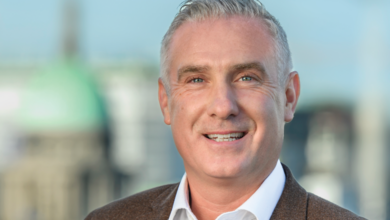Laura Burke: The environment as our most valuable asset
 The EPA’s Director-General, Laura Burke, talks to eolas about the state of Ireland’s environment and progress in meeting the challenges on water, waste and climate change.
The EPA’s Director-General, Laura Burke, talks to eolas about the state of Ireland’s environment and progress in meeting the challenges on water, waste and climate change.
Laura Burke starts with the observation that “clear, accurate and timely information” is vital in underpinning policy and decision-making and highlights the EPA’s four-yearly ‘state of the environment’ report as essential in that regard.
The 2008 report identified Ireland’s environment as an asset under threat. Four years on, the recession has offered a reprieve and has assisted us in meeting some of our short-term targets and obligations. The most recent report, the fifth, published earlier this year, provides the most up to date and comprehensive evidence-based assessment of the overall quality of Ireland’s environment. It analyses the multiple pressures being placed on our environment, the responses to current and emerging environmental issues, progress against all key European targets and “the steps needed to make progress against these targets.”
Recognising that the environment does not exist in isolation, the 2012 report includes, for the first time, a chapter looking at the link between the environment and the health of the population and an extended section looking at the link between the environment and the economy.
The most recent report shows progress in some areas, such as waste management and air quality, “where we are doing well,” says Burke. In other areas such as nature protection, water quality and climate change “we have major challenges to meet and critical decisions to take to protect this most precious resource,” she adds.
Burke believes that any discussion on water reform should be framed in the context that “our valuable and abundant water resources are predicted to become of increasing strategic importance to the economy and offer Ireland a competitive advantage.”
The priority in terms of water quality is the successful implementation of the Water Framework Directive (WFD) which the Director-General says is a “key national requirement for ‘good’ water quality in Ireland and to avoid adverse European Court judgments.” Successful implementation of the WFD will require changes in governance arrangements which should be implemented in parallel with the setting up of Irish Water “to ensure an integrated, holistic approach of both water services delivery and water quality.”
However, Ireland still faces considerable challenges to meet the objectives of the Directive within the required timeframes. The three main challenges for water quality management are, firstly, to eliminate serious pollution associated with point sources; secondly, to tackle diffuse pollution; and thirdly, to use the full range of legislative measures in an integrated way to achieve better water quality.
Burke highlights the need for substantial and sustained investment in infrastructure for the treatment of wastewater. The EPA’s experience from licensing wastewater treatment plants sees the need for the investment in infrastructure and also the need for a step change in the operation and maintenance of these plants. The EPA’s role as environmental regulator for the wastewater sector will continue with the establishment of Irish Water.
Turning to climate change, Burke says that EPA projections show that Ireland is on track to meet the Kyoto emission targets for the period 2008-2012. However, she says that the 2020 target presents “real challenges for the country and even under the most optimistic scenario, it is estimated that we will exceed our limits from 2017 onwards.”
She adds: “We cannot rely on a recession to meet our long-term carbon reduction requirements and we must develop as a low carbon economy. In order to ensure that our future economic growth is sustainable, it must be more resource efficient and decoupled from increases in emissions.”
The main challenges with greenhouse gas emissions for Ireland are in the transport and agriculture sectors. “We need to be highly aware of two factors as we set about reducing emissions. Under Food Harvest 2020, emissions from agriculture will rise as the sector expands. And as the economy recovers, demand for transport will once again increase. Our emissions reductions in both of these sectors will need to be achieved in that context.”
Addressing these challenges will require sectoral mitigation goals to ensure climate actions are mainstreamed into strategic development plans and goals. Burke also says that sectors, institutions and governance bodies need to plan for adaption to climate change impacts and ensure that any future investments take into account anticipated changes in Ireland’s changing climate.
Environment and economy
A theme running through the interview is that the environment does not exist in isolation: “It both affects, and is affected by, many aspects of our lives.”
Environmental resources and ecosystem services are direct inputs into the economy. Clean water, air, soil and biodiversity all contribute to a successful economy. Ireland’s clean, green image also provides benefits in terms of tourism and agri-food marketing.
“However, we cannot just state that we are green and clean. We need to demonstrate this,” Burke says. “It is critical therefore that Ireland’s image is not undermined by perceived poor environmental performance and that Ireland complies with our international commitments and ensures that legislation is implemented in a timely and appropriate manner.
“Poor implementation can harm the environment and human health, it generates regulatory uncertainty for industry and it puts in question the level playing field, while long-term remediation costs can be higher than the cost of prevention.”
 To emphasise the importance of implementation, Burke highlights the fact that in 2010 Ireland had more than 32 EU infringement proceedings against it. This has now more than halved, with 14 cases open at the end of March 2012.
To emphasise the importance of implementation, Burke highlights the fact that in 2010 Ireland had more than 32 EU infringement proceedings against it. This has now more than halved, with 14 cases open at the end of March 2012.
“Although this is welcome, Ireland also has formidable challenges in meeting international obligations in coming years,” she adds.
Recession
The current economic recession – while it has brought so much hardship and difficulty – does provide an opportunity to break the cycle of unsustainable economic growth and follow an environmentally sustainable approach to production and consumption, with a focus on resource efficiency.
Resource efficiency has become one of the top environmental priorities and is one of the seven flagship initiatives within the Europe 2020 strategy. “It is also an economic reality with the OECD highlighting that resource use at existing levels will act as a barrier to future economic growth. Embracing resource efficiency offers a path to job creation and economic growth.”
Ireland has a “well established and well resourced” National Waste Prevention Programme which is seen as an example of best practice in Europe. The programme, led by the EPA, represents the work of the public and private sectors in driving resource efficiency and in developing a sustainable approach to waste management. The success of the EPA’s National Waste Prevention Programme “has demonstrated that well targeted and well designed resource efficiency initiatives can result in savings and gains to business and at the same time lead to positive environmental outcomes.”
In 2011 alone, €3 million was invested in resource efficiency projects as part of the EPA National Waste Prevention Programme, resulting in economic savings worth in excess of €12 million for the participant organisations. “This shows the win-win opportunities for improving business efficiency whilst also protecting the environment.”
The environment and health
Environmental protection and health protection are inextricably linked and Burke sees protecting the Irish environment as playing an essential role in protecting the health of the population. She explains: “Clean air and water are essential to health, but physical activity, activities of daily living, transportation, urban design, community participation, food supply and nutrition also impact on health and are directly related to both the environment and well-being.”
Maintaining and benefiting from a healthy environment requires co-ordinated efforts from many government and public bodies to ensure that current and future activities maintain or improve the quality of the environment. Business and industry also play an important role in this area by ensuring that their activities do not cause pollution or create environmental liabilities for future generations. And the public also plays an important part by not polluting their local environment and by taking advantage of the tangible benefits to health that come from contact with a good-quality environment.
The 2008 State of the Environment report identified Ireland’s environment as an asset under threat. Four years on, Burke believes that it is still under threat. “The recession has given us a reprieve and has assisted us in meeting some of our short term targets and obligations. However, we must not assume that recession induced reductions mean that environmental pressures are being managed in a sustainable way,” she comments.
“We need to learn from the mistakes of the past and ensure that we do not repeat them in the future. Ultimately, Ireland needs to ensure that its economic renewal and recovery are based strongly on the principles of sustainable development, and that we decouple future economic growth from environmental pressures.”
In this context, the most recent State of the Environment report identifies four key environmental challenges for Ireland:
• Valuing and protecting our natural environment;
• Building a resource-efficient, low-carbon economy;
• Implementing environmental legislation; and
• Putting the environment at the centre of our decision-making.
Burke sees the challenges identified in this report as “significant and not all will be resolved in the short or even medium term.” They will require “concerted and determined action” across a range of government departments, state agencies and local authorities, working together to tackle these complex issues and implement the right policies and solutions: “Such an approach is all the more pertinent now, given the pressure on resources across the Public and Civil Service.”
Burke believes that meeting these four challenges will ensure that Ireland’s natural resources will not be degraded or exhausted and that the environmental conditions are in place for a successful economy and for the health and well-being of this and future generations
“This current State of Environment report is being published at a time when the country is facing severe economic challenges and where the public finances are under considerable pressure,” she remarks. “At times such as this, it may be tempting to view the protection and management of our environment as a luxury. However, it should be remembered that not only does Ireland’s natural environment have an intrinsic value in its own right and a resource that should be able for all to enjoy; it is also a precious national asset and a key strategic asset for the country.”
Ireland’s abundant water resources are predicted to become of increasing strategic importance to the Irish economy and have the capacity to position Ireland well in terms of competitiveness.
Similarly, Ireland’s biodiversity is valued in excess of €2.6 billion per annum, from which the economy and society derive a variety of services including food production and recreation. In addition, a healthy, protected and well managed environment underpins the development of our key economic sectors, such as tourism and agri-food industry which thrive on the clean and green image of Ireland.
“However, the responsibility for protecting and managing Ireland’s environment lies not only with government departments and agencies; it is a shared responsibility involving all citizens of Ireland,” she states. “Businesses, industry, farmers, and members of the public all have a role to play. We need to mobilise each of the more than four and a half million people living in Ireland and ensure that the environment is placed at the heart of our decisions and actions.”
Burke continues: “A cornerstone of sustainability is behaviour change. Partly due to the recession, over the course of the last few years, people have become more conscious of reducing waste, water and energy, which has tangible environmental benefits.” She concludes: “This is not about putting one or the other first, the environment or the economy. It is about making the right choices; it’s about recognising the imperative for each one of us, in our homes, in our communities, in our businesses and at a policy level, to take every action we can to be more sustainable.”





